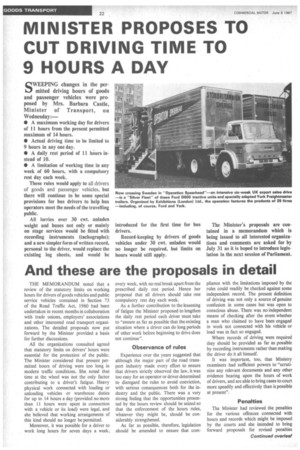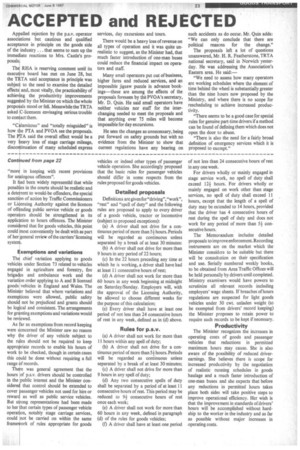And these are the proposals in detail
Page 24

Page 25

If you've noticed an error in this article please click here to report it so we can fix it.
THE MEMORANDUM noted that a review of the statutory limits on working hours for drivers of goods vehicles and public service vehicles contained in Section 73 of the Road Traffic Act, 1960 had been undertaken in recent months in collaboration with trade unions, employers' associations and other interested road transport organizations. The detailed proposals now put forward by the Minister provided a basis for further discussions.
All the organizations consulted agreed that statutory limits on drivers' hours were essential for the protection of the public. The Minister considered that present permitted hours of driving were too long in modern traffic conditions. She noted that time at the wheel was not the only factor contributing to a driver's fatigue. Heavy physical work connected with loading or unloading vehicles or warehouse duties for up to 14 hours a day (provided no more than 11 hours were spent in connection with a vehicle or its load) were legal, and she believed that working arrangements of this kind should no longer be permitted.
Moreover, it was possible for a driver to work long hours for seven days a week, every week, with no real break apart from the prescribed daily rest period. Hence her proposal that all drivers should take one compulsory rest day each week.
As a further contribution to the lessening of fatigue the Minister proposed to lengthen the daily rest period each driver must take to "ensure as far as possible that the existing situation where a driver can do long periods of other work before beginning to drive does not continue".
Observance of rules Experience over the years suggested that although the major part of the road transport industry made every effort to ensure that drivers strictly observed the law, it was too easy for an operator or driver determined to disregard the rules to avoid conviction, with serious consequences both for the industry and the public. There was a very strong feeling that the opportunities presented by the hours review should be seized so that the enforcement of the hours rules, whatever they might be, should be considerably strengthened.
As far as possible, therefore, legislation should be amended to ensure that corn
pliance with the limitations imposed by the rules could readily be checked against some independent record. The present definition of driving was not only a source of genuine confusion in some cases but was open to conscious abuse. There was no independent means of checking after the event whether a man who claimed to have been engaged in work not connected with his vehicle or load was in fact so engaged.
Where records of driving were required they should be provided as far as possible by recording instruments rather than making the driver do it all himself.
It was important, too, that Ministry examiners had sufficient powers to "scrutinize any relevant documents and any other evidence bearing upon the hours of work of drivers, and are able to bring cases to court more speedily and effectively than is possible at present".
Penalties The Minister had reviewed the penalties for the various offences connected with hours and records which might be imposed by the courts and she intended to bring forward proposals for revised penalties "more in keeping with recent provisions for analogous offences".
It had been widely represented that while penalties in the courts should be realistic and a deterrent to would-be offenders, the special sanction of action by Traffic Commissioners or Licensing Authority against the licences of offending public service vehicle or goods operators should be strengthened in its application to hours offences. The Minister considered that for goods vehicles, this point could most conveniently be dealt with as part of her general review of the carriers' licensing system.
Exemptions and variations The chief variation applying to goods vehicles under Section 73 related to vehicles engaged in agriculture and forestry, fire brigades and ambulance work and the variation order applying to A and B licensed goods vehicles in England and Wales. The Minister believed that where variations and exemptions were allowed, public safety should not be prejudiced and grants should be logical and consistent. The arrangements for granting exemptions and variations would be reviewed.
As far as exemptions from record keeping were concerned the Minister saw no reason why the driver of any vehicle subject to the rules should not be required to keep appropriate records to enable his hours of work to be checked, though in certain cases this could be done without requiring a full range of records.
There was general agreement that the hours of p.s.v. drivers should be controlled in the public interest and the Minister considered that control should be extended to cover passenger vehicles not used for hire or reward as well as public service vehicles. But strong representations had been made to her that certain types of passenger vehicle operation, notably stage carriage services, could not be carried on within the same framework of rules appropriate for goods vehicles or indeed other types of passenger vehicle operation. She accordingly proposed that the basic rules for passenger vehicles should differ in some respects from the rules proposed for goods vehicles.
Detailed proposals
Definitions are given for "driving","work ", "rest" and "spell of duty" and the following rules are proposed to apply to every driver of a goods vehicle, tractor or locomotive (subject to proposed exceptions): (a) A driver shall not drive for a continuous period of more than 54 hours. Periods will be regarded as continuous unless separated by a break of at least 30 minutes: (b) A driver shall not drive for more than 9 hours in any period of 22 hours; (c) In the 22 hours preceding any time at which he is working, a driver shall have had at least 11 consecutive hours of rest; (d) A driver shall not work for more than 60 hours in any week beginning at midnight on Saturday/Sunday. Employers will, with the approval of the Licensing Authority, be allowed to choose different weeks for the purpose of this calculation; (e) Every driver shall have at least one period of not less than 24 consecutive hours of rest in any week, defined as in (d) above.
Rules for p.s.v.
(a) A driver shall not work for more than 11 hours within any spell of duty; (b) A driver shall not drive for a continuous period of more than 54 hours. Periods will be regarded as continuous unless separated by a break of at least 30 minutes; (c) A driver shall not drive for more than 9 hours in any spell of duty; (d) Any two consecutive spells of duty shall be separated by a period of at least 11 consecutive hours of rest. This period may be reduced to 94 consecutive hours of rest once each week; (e) A driver shall not work for more than 60 hours in any week, defined in paragraph (d) of the rules for goods vehicles; (f) A driver shall have at least one period of not less than 24 consecutive hours of rest in any one week.
For drivers wholly or mainly engaged in stage service work, no spell of duty shall exceed 124 hours. For drivers wholly or mainly engaged on work other than stage services, no spell of duty shall exceed 11 hours, except that the length of a spell of duty may be extended to 14 hours, provided that the driver has 4 consecutive hours of rest during the spell of duty and does not work for any period of more than 54 consecutive hours.
The Memorandum includes detailed proposals to improve enforcement. Recording instruments are on the market which the Minister considers to be suitable but there will be consultation on their specification and use. Serially numbered weekly books, to be obtained from Area Traffic Offices will be held personally by drivers until completed. Ministry examiners would have powers to scrutinize all relevant records including employers' wage sheets. If breaches of hours regulations are suspected for light goods vehicles under 30 cwt. unladen weight (to be exempted from drivers' record keeping) the Minister proposes to retain power to require such records to be kept if necessary.
Productivity
The Minister recognizes the increases in operating costs of goods and passenger vehicles that reductions in permitted maximum hours may cause. She is also aware of the possibility of reduced driverearnings. She believes there is scope for increased productivity by the negotiation of realistic running schedules in goods haulage and a much faster introduction of one-man buses and she expects that before any reductions in permitted hours takes place both sides will take positive steps to improve operational efficiency. Her wish is that the improvement in standards of drivers' hours will be accomplished without hardship to the worker in the industry and as far as possible without major increases in • operating costs.




























































































































